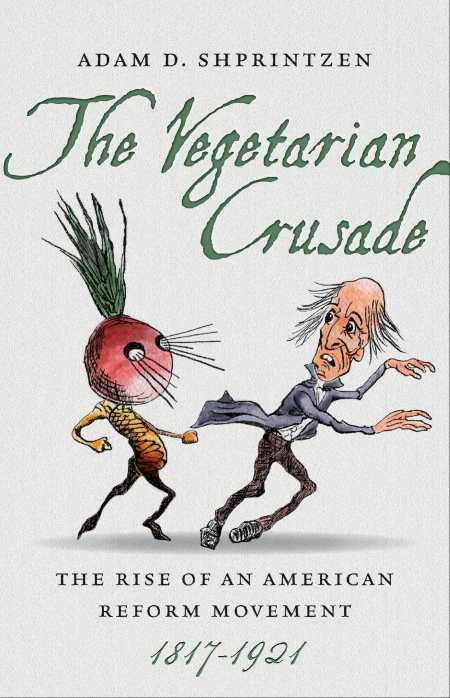The Vegetarian Crusade
The Rise of an American Reform Movement, 1817-1921
History of vegetarianism in America offers insight into shifting of social movements into mainstream thinking.
This unique, readable history of the vegetarian movement in America reveals its deep roots; transplanted from Europe in the early 1800s, the movement was nurtured by some of the most famous names in American food history and was in full bloom by the early 1920s.
Adam D. Shprintzen is an historian specializing in nineteenth-century America. His examination of the vegetarian tradition from 1817–1921 in the United States will make fascinating reading for proponents of a healthy lifestyle and students of Americana alike.
Vegetarianism landed here with our first settlers, among groups such as Bible Christians and followers of Sylvester Graham. In 1850, the American Vegetarian Society was born and soon developed a broad reformist stance through such activists as Bronson Alcott, who established Fruitlands, a vegetarian utopian community, and zealous preacher Graham who, in the early 1800s, made a name for himself in the temperance movement and quickly moved to the realm of general health. He advocated meatless meals, cold baths, and hard bread (the progenitor of the still popular “cracker”). Grahamites, typically mocked in the mainstream press, started a chain of purist boardinghouses. Vegetarian John Harvey Kellogg studied at a medical college before founding the Battle Creek Sanitarium in Michigan in 1866, where vegetarian eating was “non-negotiable” for guests and staff. Kellogg coined the word “sanitarium”—from the British term “sanitorium”—and devised “a prototype for what would become corn flakes.” Shprintzen states that, “By 1916, vegetarianism occupied a middle ground between being a subcultural group and being a mainstream movement.”
Taken on “innocently enough” when the author recently become a vegetarian, Shprintzen’s book will be a welcome addition to vegetarian lore in a time when the movement has entered mainstream thinking, if not mainstream eating. The book is sparsely and appropriately illustrated, its cover a cartoon from an 1860 issue of Vanity Fair showing a hapless citizen pursued by a monster with a beetroot head. Throughout the work, the author makes a cogent case for his basic thesis: the American vegetarian movement has never been limited to dietary concerns; those who espouse a meat-free diet have in general been conscience-driven gadflies with a broad agenda of social change issues.
Deftly combining historical fact (vegetarian goals and ideals are not merely “a product of twentieth-century modernism”) with a broader definition of vegetarianism (not simply a health intervention but a socially-conscious reform initiative), The Vegetarian Crusade offers a useful perspective on significant streams of American radicalism, with tendrils reaching into politics, humanitarian concerns, personal morality, and self-help.
Reviewed by
Barbara Bamberger Scott
Disclosure: This article is not an endorsement, but a review. The publisher of this book provided free copies of the book to have their book reviewed by a professional reviewer. No fee was paid by the publisher for this review. Foreword Reviews only recommends books that we love. Foreword Magazine, Inc. is disclosing this in accordance with the Federal Trade Commission’s 16 CFR, Part 255.

